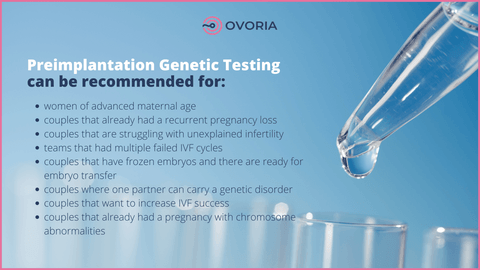Home I Blog I Preimplantation Genetic Testing (PGT): What is It, The Types of PGT and The Reasons For PGT?
Preimplantation Genetic Testing (PGT): What is It, The Types of PGT and The Reasons For PGT?
Nowadays, reproductive medicine provides many opportunities for couples struggling with infertility issues, offering such fertility treatments as In Vitro Fertilization (IVF), Third-party- assisted ART (Assisted Reproductive Technologies) that involve egg donation, sperm donation, embryo donation, surrogate carries. Infertility can result from various causes, including ovulation disorders, blocked or damaged fallopian tubes, endometriosis, pelvic inflammatory disease (PID), uterine fibroids, hormonal imbalances, sexually transmitted diseases (STDs), obesity or being too thin. Male infertility can result from low sperm count or poor sperm quality. Every day these fertility techniques are developing, and during IVF procedure, recipients can choose the sex gender of their future child. Maybe it sounds like plot ideas for a science fiction movie, but in reality, it is one of the services that offer in vitro fertilization procedures. In this article, you will find out information about types of Preimplantation Genetic Testing, who need to undergo PGT and reasons for PGT.

What Is PGT (Embryo Preimplantation Genetic Testing?)
Preimplantation genetic testing (PGT) is a screening examination of embryo cells that are always performed on embryos to check genetic disease and abnormality with the In Vitro Fertilization technique. As we know, A euploid embryo contains 46 pairs of chromosomes. This number of chromosomes is considered normal. These number chromosome consists of 23 chromosomes that come from the sperm and 23 chromosomes from the egg. But if the embryo has more or less than 46 chromosomes, it is considered an abnormality. Monosomy is a condition with a missing chromosome. Trisomy, also known as Edwards syndrome, is a condition caused by several chromosomes.
If an embryo has more or less 46 pairs of chromosomes can cause pregnancy loss or health problems for the child.
What Are the Types of Preimplantation Genetic Testing?
There are a few types of Preimplantation Genetic Testing:
PGT- A (preimplantation genetic testing for aneuploidy) is a type of PGT that checks embryos for chromosomal status by screening 23 pairs of human chromosomes. Aneuploidy is the most common known cause of embryo implantation failure, miscarriage, congenital disabilities or genetic disorders as Down Syndrome or Turner syndrome. Thank this genetic testing, we will get information about:
- Euploid
- Aneuploid
- Mosaic
PGT-M (preimplantation genetic testing for monogenic or single-gene defects) is another type of preimplantation genetic testing performed on embryos through IVF cycle to check the possibilities of having the congenital disease. Compared to the preimplantation genetic testing for aneuploidy, this genetic testing will provide information about options for specific genetic conditions. The couples can consider OGT-M if they have an increased risk of having a child with birth defects.
PGT-SR (preimplantation genetic testing for structural rearrangements of chromosomes) is a genetic test that checks chromosomal structure rearrangements provided through IVF to establish a healthy pregnancy.
Who Can be Advised for Genetic Testing?
We need to remember that genetic disorders can cause pregnancy loss, infertility, or problems with the future child's health. That's why there is a list of recipients who can be advised for genetic testing:
- Women of advanced maternal age. Women under the age of 35 usually have embryos with regular pairs of chromosomes, but women over the age of 40-41 have an increased level of aneuploidy. Moreover, we also know about the biological clock in women that's mean that with age, egg quality and egg quantity are decreasing
- Couples that already had a recurrent pregnancy loss
- Couples that are struggling with unexplained infertility
- Teams that had multiple failed IVF cycles
- Couples that have frozen embryos and there are ready for embryo transfer.
- Couples where one partner can carry a genetic disorder
- Couples that want to increase IVF success
- Couples that already had a pregnancy with chromosome abnormalities

What Are the Reasons for PGT?
The reasons for doing preimplantation genetic testing can vary, but there is a list of possible reasons for PGT:
- Decreasing level of multiple pregnancies
- Knowing the sex of the embryo
- Family balancing for sex selection
- Increase level of IVF success

